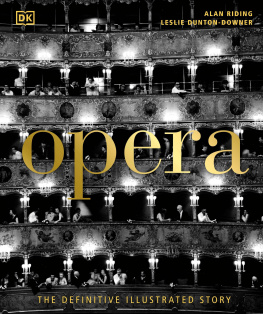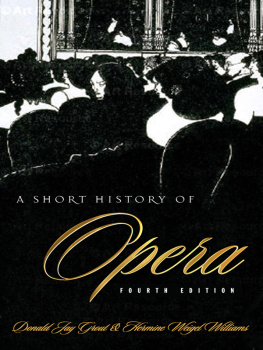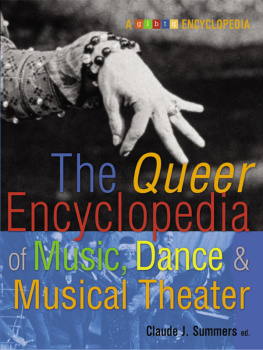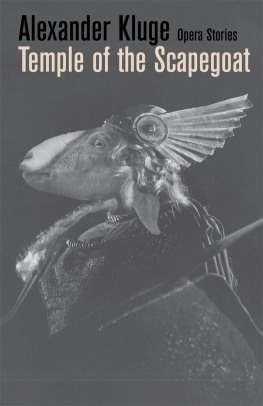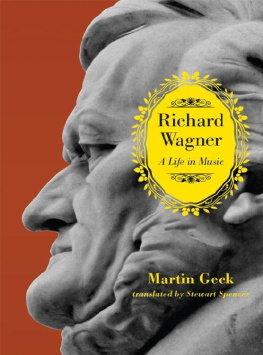Table of Contents
Guide
I AM MUCH BETTER SUITED TO TALKING ABOUT narratives than telling them. Nevertheless, the only orderly way I can conceive of recognizing the many individuals who have shaped the ideas in this book and have made its publication possible is as a story. It begins with a clarinetist in the pit of the MacMillan Theatre at the University of Toronto. As my husband is fond of relating, he could always pick me out as the one whose head was firmly turned toward the stage whenever I was not required to play. When I decided that I needed to see more of that world, I discovered that the University of Toronto was also home to a large and lively community of opera scholars. The courses I took in my first term of graduate studies in musicologyLinda Hutcheon and Caryl Clarks interdisciplinary opera class and Sherry Lees aesthetics seminaranticipate many of the aims and preoccupations of this book. Linda, Caryl, Sherry, and the other members of the Operatics working group provided me with a model of collaborative, interdisciplinary scholarship.
In Trevor Ponechs cinematic narrative seminar at McGill University, I discovered that many of the questions philosophers were asking of cinema had not been given serious attention in opera studies. More than providing me with the topic and methodology for this book, Trevors class opened up an entire branch of scholarship that was virtually unknown in musicology. There I found my scholarly calling to make work in analytic philosophy better known in my field. I am grateful for Trevors unwavering belief in my work and continual encouragement to think bigger in terms of its import. In revising my early work on this book, his advicebe shorter, sharper, and more shockinghas served me well.
These ideas may never have reached a musicological audience without the mentorship of Lloyd Whitesell. Even when he was less than convinced by some of them, he helped me make the best possible case for their utility to the musicological reader. There have been many times that I have submitted something to him, believing that to be my final version, only to be told that I could do better. Although I cant say that I always appreciated this advice at the time, those extra rounds of revision have often made the difference between a verdict of revise and resubmit and an outright rejection.
Edmund Goehring is another scholar who has helped me find a place in musicology. Ed assured me that the discipline could benefit from what I had to say and that there were kindred spirits who would listen. He has been one of my most important interlocutors and incisive critics. His good influence has encouraged me to read more widely, think more broadly, and heed that old narratological adage to show, whenever possible, rather than tell.
McGill proved to be an equally fertile intellectual and creative environment in which to develop the ideas for this study. I benefitted from countless conversations with and suggestions from Lloyd Whitesell, Trevor Ponech, Steven Huebner, David Davies, Lars Lih, and Allan Hepburn. David Davies suggested that the ingredients model may have more applicability to opera performance than I had initially assumed, a suggestion that led me to rethink the theoretical foundations of the latter portion of this book.
My tremendously talented peers at McGill and elsewhere provided invaluable intellectual and moral support. Zoey M. Cochran has taught me a tremendous amount about Italian opera and also how to become my own refuge from lifes disappointments. The singer-cum-director Russell Wustenbergs belief that these ideas would be of interest to performers has encouraged me to expand my coverage of performance in this book. I am grateful to Harry Thorrington for improving my taste in literature and for sharing his insatiable appetite for life; Alyssa Michaud for discussions about opera and new media and for Sunday Star Trek, a highlight of my week; Kristin Franseen for conversations about British literature and queer culture over beers at Benelux; Kyle Kaplan for being a lively interlocutor on any subject; and Margaret Frainier for being the first scholar to apply the ideas in this book and, in so doing, expanding my knowledge of Russian opera. My regular Skype chats with Amanda Hsieh, no matter where in the world we happen to be, have kept me feeling connected and supported.
I finished drafting this book during a postdoctoral fellowship at Duke University, funded by the Social Sciences and Humanities Research Council of Canada. Philip Rupprecht and Cathy Shuman made me feel welcome at Duke and in Durham. Phil helped me navigate the tricky transition from student to scholar through many long conversations at Whole Foods and careful readings of drafts of several chapters of this book. I benefited from conversations with many members of the music faculty, staff, and students, particularly Bryan Gilliam and Karen Messina.
This books inclusion of more popular forms of musical theater is a product of the seminars I taught at Duke. I am especially grateful to the students of Adaptation and Musical Theatre for reading an early draft of and for suggesting examples for the section on ambiguous cases. That this book contains any musicals from the twenty-first century is largely due to conversations I had with Adam Beskind, Alexus Wells, Chandler Richards, Brennan Zook, C. J. Cruz, and other dedicated members of my classes and Dukes student-run musical theater company Hoof n Horn.
My arguments have matured through sharing this work with audiences at McGill, Duke, the University of Western Ontario, the College of Charleston Aesthetic Work Group, the Royal Musical Association Music and Philosophy Study Group, the Canadian University Music Society, the Modern Language Association, and the American Society for Aesthetics. Tomas McAuleys tireless stewardship of the RMA MPSG has done much to facilitate productive exchanges between musicology and analytic philosophy.
When I attended my first ASA in 2018, I was overwhelmed by the welcome I received and impressed by the societys commitment to diversity and inclusivity. I thank James Hamilton for his formal response to my paper and for our conversations during the course of the conference. At the business luncheon, I had the good fortune of sitting next to Andrew Kania, who was generous enough to read the entire manuscript. His comments and our exchanges over email have helped me to clarify my arguments, particularly on ontological matters.
One of the challenges of studying a live performance medium is that one is typically able to experience works only a single time. My ability to comment in detail on many of the works I discuss has been made possible by the composers, librettists, and directors who have shared unpublished materials with me. Joel Ivany and Aria Umezawa shared their libretti to A Little Too Cozy and The Barber of Cowtown. Kevin March generously provided me with the score and an archival video recording of his and Michel Marc Bouchards Les feluettes, granted me permission to reproduce musical examples in this book, and caught several mistakes in .
I am grateful to Robert Hatten for understanding what this study is about and for suggesting that, like any good story, it needs an ending. Thanks are also due to my editors at Indiana University Press, Janice Frisch and Allison Chaplin, to the two anonymous reviewers for their thoughtful comments and suggestions, and to Jennifer Crane for her careful copyediting.
The completion of this book has also depended on the support of many people outside of the academy, particularly my parents, Alvin Penner and Ewa Franks, and my partner in opera appreciation and in life, Kevin Bragg. The difference they have made is as great as it is difficult to enumerate. Kevin has spent more time than anyone else discussing the ideas in this book with me. Thank you for the post-opera postmortems and for teaching me that there is more to life than work. I look forward to bringing this story to a close and to starting a new one very soon.
Next page

